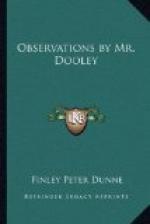“I don’t believe in profanity, Hinnissy—not as a reg’lar thing. But it has its uses an’ its place. F’r instance, it is issintial to some thrades. No man can be a printer without swearin’. ’Tis impossible. I mind wanst I wint to a printin’ office where a frind iv mine be th’ name iv Donovan held cases an’ I heerd th’ foreman say: ‘What gintleman is setting A thirty?’ he says. ‘I am,’ says a pale aristocrat with black whiskers who was atin’ tobacco in th’ rear iv th’ room. ‘Thin,’ says th’ foreman, ’ye blankety-blank blacksmith, get a move on ye. D’ye think this is a annyooal incyclopejee?’ he says. Ivrybody swore at ivrybody else. Th’ little boys runnin’ around with type prattled innocent pro-fanity an’ afther awhile th’ iditor come in an’ he swore more thin annybody else. But ‘twas aisy to see he’d not lamed th’ thrade iv printer. He swore with th’ enthusyasm an’ inacc’racy iv an amachoor, though I mus’ say, he had his good pints. I wisht I cud raymimber what it was he called th’ Czar iv Rooshya f’r dyin’ jus’ as th’ pa-aper was goin’ to press. I cud’ve often used it since. But it’s slipped me mind.
“Swearin’ belongs to some thrades,—like printin’, bricklayin’ an’ plumbin’. It is no help at all, at all to tailors, shoemakers, hair-dressers, dintists or authors. A surgeon needs it but a doctor niver. It is a great help in unloadin’ a ship an’ sailor men always swear—th’ cap’n an’ mate whin wurruk is goin’ on an’ th’ men befure th’ mast at meals. Sojers mus’ swear. They’se no way out iv it. It’s as much th’ equipment iv a sojer as catridges. In vigorous spoort it is niciss’ry but niver at checkers or chess an’ sildom at dominoes. Cowboys are compelled to use it. No wan cud rope a cow or cinch a pony without swearin’. A sthrick bringin’ up is th’ same as havin’ a wooden leg on th’ plains. Profanity shud be used sparingly if at all on childher—especially girls—an’ sildom on women, though I’ve knowed an occasional domestic: ’Damn ye’er eyes’ to wurruk wondhers in reg-latin’ a fam’ly. Women can’t swear. They have th’ feelin’ but not th’ means. Westhern men swear betther thin Eastern men though I mus’ say th’ mos’ lib’ral swearers I iver knew come fr’m Boston.
“But it don’t do to use pro-fanity th’ way ye wud ordin’ry wurruds. No, sir. Ye’ve got to save it up an’ invist it at th’ right time or get nawthin’ fr’m it. It’s betther thin a doctor f’r a stubbed toe but it niver cured a broken leg. It’s a kind iv a first aid to th’ injured. It seems to deaden th’ pain. Women an’ childher cry or faint whin they’re hurt. That’s because they haven’t th’ gift iv swearin’. But as I tell ye, they’se no good wastin’ it. Th’ man that swears at ivrything has nawthin’ to say when rale throubles come. I hate to hear annywan spillin’ out th’ valyable wurruds that he ought to save to be used whin th’ shtove-pipe comes down. Not that it shocks me. I’m a dimmycrat. But I know th’ foolish man




